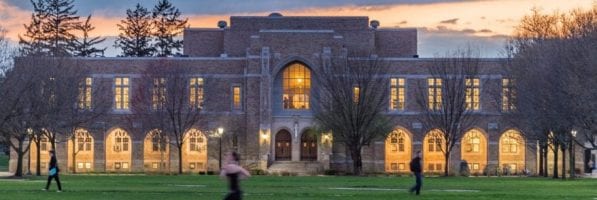Notre Dame Mendoza Announces Newest MBA Deadlines

Notre Dame University’s Mendoza College of Business recently announced its newest full-time MBA deadlines for the upcoming 2019-20 academic season.
Notre Dame MBA Deadlines
Early Decision
Application Deadline: Sep. 17, 2019
Decision Notification: Nov. 1, 2019
Round One
Application Deadline: Oct 15, 2019
Decision Notification: Dec. 13, 2019
Round Two
Application Deadline: Jan. 7, 2020
Decision Notification: March 13, 2020
Round Three
Application Deadline: March 17, 2020
Decision Notification: May 1, 2020
Round Four
Application Deadline: April 14, 2020
Decision Notification: May 22, 2020
UVA, Oxford, CEIBS Rise in All-New Financial Times 2019 Ranking

The latest Financial Times MBA ranking is officially out, with several international schools rising closer and closer to the top in 2019.
Kellogg On Pharma’s Lack of Innovation, and More – Chicago News

Let’s explore some of the most interesting stories that have emerged from Chicago business schools this week.
Everyone Wants Pharmaceutical Breakthroughs. What Drives Drug Companies to Pursue Them? – Kellogg Insights
Northwestern University Kellogg School of Management Professor of Finance Dimitris Papanikolaou recently co-authored new research that illuminates why “pharmaceutical firms these days often make minor changes to existing medications instead of delivering innovative drugs.”
The study, which was co-authored with HBS’s Joshua Krieger and MIT Sloan’s Danielle Li, found that “financial frictions may be limiting innovation.”
According to the article, “The researchers found that firms were eager to work on novel drugs—under the right financial circumstances. When pharmaceutical companies got a windfall, such as a sudden increase in profits, they were more likely to spend it on developing novel drugs than on incremental improvements.”
You can read more about the trio’s research here.
Kadiani Finds Passion for Social Entrepreneurship at Gies Business – Gies College of Business News
The University of Illinois Gies College of Business recently profiled current Master of Accountancy Science student Hamed Kadiani whose social entrepreneurship journey began as part of student organization Illinois Enactus, which helped him understand his desire to see “what the root of the problem is, and then develop a solution that fixes the cause, not the symptom.”
Kadiani later served as project manager for Project Oasis, an “online center that connects immigrants to resources in Champaign-Urbana, provides access to 75 resources in six main focus areas such as healthcare and education, [and] teaches immigrants financial literacy and entrepreneurial skills.”
According to the interview, Kadiani plans to become a CPA but shared his ambitions to some day run for political office.
“I hope I made an impact on campus, but I truly believe this work made more of an impact on me. I am who I am today because of this university and Gies College of Business.”
You can read more from the Gies College of Business News profile here.
Mendoza’s Marketing Major Puts a Strong Emphasis on Digital Skills – Mendoza Ideas & News
Notre Dame Mendoza’s Marketing Department recently recruited Professor Timothy Bohling, who will teaching Digital Marketing to both undergraduate and graduates in spring 2019.
Having previously held senior executive leadership positions at Stratasys, HCL Technologies, and IBM, Bohling’s research and teaching interests are “centered both on scholarly rigor and practitioner relevance in areas of digital marketing, customer relationship management, decision modeling, customer lifetime value and innovation adoption.”

The Mendoza Marketing Department has introduced four specialized tracks that emphasize data-based strategies: marketing decision analytics, brandscaping; consulting and market development; and digital marketing.
You can read more about Bohling, his research, and the 2019 courses here.
Notre Dame Mendoza Announces New Master’s, and More – Chicago News

Let’s explore some of the most interesting stories that have emerged from Chicago business schools this week.
Notre Dame’s New One-Year Graduate Business Degree Focuses on Nonprofit Leadership – Mendoza Ideas & News
The Notre Dame University Mendoza College of Business recently launched a new one-year, 36-credit-hour lockstep Master of Nonprofit Administration (MNA) degree intended especially for nonprofit leaders.
Angela Logan, the St. Andre Bessette Director of Nonprofit Professional Development, says, “ Students enter the program with ‘a servant heart,’ and we believe when they graduate, they will also have ‘a business mind.’”
“The Notre Dame MNA affords students who have a commitment to serving the nonprofit sector an opportunity to learn from world-class faculty, who provide a solid business education to prepare them to lead global nonprofit organizations.”
You can find out more about the brand new Notre Dame Masters program here.
How Peer Pressure Can Lead Teens to Underachieve—Even in Schools Where It’s “Cool to Be Smart” – Kellogg Insight
A new study from Northwestern Kellogg School of Management Professor of Managerial Economics and Decision Sciences Georgy Egorov finds that in “smart-to-be-cool” schools, “kids shy away from showing effort in front of their peers” either because they might “face a social stigma for publicly making an effort to excel” but in “cool-to-be-smart” schools, they simply may not want to “reveal their poor grasp of the material.”
Egorov explains, “In a cool-to-be-smart school, students might be more likely to attend an after-school program if it is called “enrichment” rather than “extra help.” But in a smart-to-be-cool school, kids might find it more socially acceptable to seek “extra help” to avoid failing a class than “enrichment,” which suggests trying to excel.”
According to the article, “the reasons why some students fail to take advantage of educational opportunities can differ greatly depending on the school’s overall culture.”
“Administrators should understand their school’s culture when designing policies. For example, making class participation mandatory in a smart-to-be cool school could reduce the stigma of raising one’s hand. But in a cool-to-be-smart school, the same policy could provoke struggling students to disrupt class so they can avoid participating.”
You can read more about Egorov’s study here.
Student Innovator Re-imagining Restaurant Menus – Gies College of Business News
The Gies College of Business News recently profiled student Patryk Swietek, whose augmented reality app Menu3, which “allows customers to view a digital restaurant menu that features a 3D overlay of a dish right on their phone,” was a direct outgrowth of the iVenture Accelerator.”
Swietek writes, “The iVenture Accelerator was on my scope of things to do before I even started here. I’ve known for a little while now that I want to pursue entrepreneurship, but I thought it would take a little while to start on a project worthy of iVenture.”
Menu3 users can rotate photos for a 360-degree view to “help customers better understand portion sizes.” According to the article, Swietek’s first restaurant partner became Champaign’s Maize. They have since added Paris Super Crepes.
iVenture director and co-founder Noah Isserman writes, “Patryk and the Menu3 team exemplify iVenture’s distinctive, community-focused approach to entrepreneurship.”
You can read more from the Patryk profile here.
Supreme Court Ideology, Deniability, and More – Chicago News

Let’s explore some of the most interesting stories that have emerged from Chicago business schools this week.
Supreme Court Justices Become Less Impartial and More Ideological When Casting the Swing Vote – Kellogg Insights
In a new paper coauthored by Northwestern Kellogg Associate Professor of Managerial Economics and Decision Sciences Jörg Spenkuch and Emory University’s Tom S. Clark and B. Pablo Montagnes, the trio found that “the effect of a justice’s ideology on how he or she votes essentially doubles when the vote is pivotal.”
Spenkuch explains, “”Our idea of a good judge is that of an impartial umpire. But justices in some cases disregard the role of the umpire in favor of that of the politician.”
“During confirmation hearings, no justice ever admits that they’re interested in making policy. There is a nontrivial number of cases that would be decided differently if justices did not vote strategically. It draws into doubt the notion of the Supreme Court as an institution where litigants come to get justice.”
You can read more about the trio’s research here.
Sidestepping the Pitfalls of Overconfidence with Plausible Deniability – Mendoza Ideas & News
In Notre Dame University Mendoza College of Business postdoctoral Research and Teaching Associate Nathan Meikle’s forthcoming Journal of Personality and Social Psychology paper, he illuminates how people in positions of power—politicians, business leaders—can successfully toe the line between confidence and arrogance.
According to the article, “expressing confidence non-verbally through making eye contact, gesturing, adopting an expansive posture or speaking in a strong voice allows people to enjoy the social benefits of expressing confidence while simultaneously reducing the risk they’ll be punished for overconfidence.”
The key is to leverage plausible deniability — “the ability to deny responsibility due to a lack of concrete evidence.”
Meikle explains, “The plausible deniability hypothesis explains why overconfidence sometimes, but not always, is punished. For example, verifiably overconfident claims, void of plausible deniability, will face consequences. However, there are a number of ways people can create plausible deniability.”
“Future claims necessarily enjoy some degree of plausible deniability because they cannot be proven wrong in the moment,” Meikle continues. “Thus, individuals boasting about future events would be expected to enjoy the benefits of expressing confidence while simultaneously sidestepping the potential costs. However, even if overconfident claims are eventually proven false, people can still create plausible deniability by undermining the messenger, such as calling it ‘fake news.’”

“One strategy is to make audacious claims about future events. President Trump frequently makes bold claims, such as he alone can bring coal mining jobs back to West Virginia,” Meikle explains / Photo via DOMINICK REUTER/AFP/Getty Images
You can read the full article from Mendoza Ideas & News here. “Is Overconfidence a Social Liability? The Effect of Verbal Versus Nonverbal Expressions of Confidence” is also available here.
Hurricane Victims Face Long, Uncertain Road to Recovery – Gies College of Business Blog
U. Illinois Gies College of Business Professor of Finance Tatyana Deryugina, who studies the financial impacts of natural disasters on families, explains that “even after the floodwaters recede … families displaced by Hurricane Florence will face months and months of financial hardship.”
Deryugina explains, “If you have kids, there’s the school closures—so parents might have to figure out what to do with their children in the meantime. Even if your workplace is open, you may not be able to go back and work. Building materials will be expensive in the short-term. A lot of people rebuilding causes supply issues.”
“Even if you rebuild, and it looks nice and new, people are going to remember this event. Not only are you going to face building and repair costs, but now your home is worth less than it was before”
She adds, “What we’re seeing with Florence is rivers overflowing, which is worse than just having the floodwater accumulate from the heavy rain because that’s going to be longer-lasting.”
“New Orleans was below sea level, so the flooding just persisted. The longer areas stay uninhabitable, the more people are going to leave and just not return. If you’re somewhere for a couple months, it becomes much easier to stay there.”
You can read the full article here.
Better Advice, Getting Kids To Stop Drinking Soda, and More – Chicago

Let’s explore some of the most interesting stories that have emerged from Chicago business schools this week.
A New Way to Persuade Kids to Drink More Water and Less Soda – Kellogg Insight
Northwestern University’s Kellogg School of Business recently published an article that surveyed a number of strategies that Associate Professor of Marketing Michal Maimaran and his colleagues pursued in collaboration with UNICEF to encourage children to drink more water and less soda.
Maimaran, Stanford’s Szu-chi Huang, BU Questrom’s Daniella Kupor, and the University of Amsterdam’s Andrea Weihrauch attempted to link “water consumption with different goals that kids might want to achieve” by designing four “Drink Water” posters, each with a distinct message: “Be Healthy,” “Learn Faster,” “Make Friends,” and no message.
According to the research, the only poster that spurred bottled-water sales was “Be Healthy,” which Maimaran believes is likely due to the fact that “kids are persuaded by messages that rely on a natural association between the action and goal, such as between being healthy and water.”
You can read more about the research here.
Capitalizing On Sleep-Wake Cycle Can Drastically Increase Digital Ad Profits From Social Media – Mendoza Ideas & News
Recent research from the Notre Dame University Mendoza College of Business shows that “digital content platforms can increase traffic to their websites from social media and boost digital ad profits simply by aligning their posting schedules with target audiences’ sleep-wake cycles, or circadian rhythms.”
Vamsi Kanuri, Assistant Professor of Marketing at Mendoza explains in his new research that, “Consumers engage more with posts containing high-arousal negative information, including anger, stress, anxiety or fear, in the morning than in the afternoon or evening. They engage more with ‘boosted’ (paid to advertise) posts and those requiring higher cognitive processing, such as op-eds or scientific material, in the afternoon.”
“Scheduling Content on Social Media: Theory, Evidence and Application” is due for publication in the Journal of Marketing soon. You can also find more on the research from Mendoza Ideas & News here.
Why is it Better to Give Advice Than Receive It? – Chicago Booth News

Chicago Booth Professor Ayelet Fishbach
A new study from and Penn’s Lauren Eskries-Winkler and Christopher H. Browne Distinguished Professor of Psychology and famed writer Angela Duckworth found that people tend to “benefit more from giving advice than receiving it.”
According to the study, which was recently discussed in the Chicago Booth News, “the very act of giving the advice makes the giver feel powerful and confident. When people lack motivation, receiving advice may actually be harmful … because it undermines feelings of competence.”
The authors note, “In the process of giving advice, advisers may form specific intentions and lay out concrete plans of action—both of which increase motivation and achievement.”
“We hope our findings, which illuminate the motivational power of giving, do just that: goad scientists and practitioners to consider the ways in which struggling individuals benefit from giving.”
“In Giving We Receive: A Counterintuitive Approach to Motivating Behavior” is due for publication in Psychological Science.
You can read the full article from the Chicago Booth News here.
